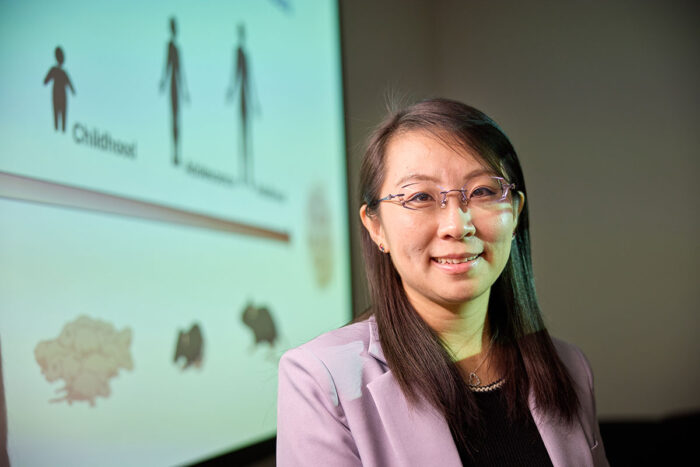Preventing early-onset colorectal cancers aim of $25 million award
School of Medicine leads international team funded by Cancer Grand Challenges
 Matt Miller
Matt MillerYin Cao, ScD, of Washington University School of Medicine in St. Louis, is leading an international team seeking to understand what is driving the increase in early-onset colorectal cancer globally. To do so, her team has received funding from Cancer Grand Challenges, co-founded by Cancer Research UK and the National Cancer Institute (NCI), part of the National Institutes of Health (NIH).
Colorectal cancer rates in adults under age 50 have been increasing in the U.S. and globally. The risk of developing such cancers has been rising with each generation since the 1950s, but scientists have not been able to explain why. Understanding the underlying causes will help design prevention strategies for future generations.
Yin Cao, ScD, an associate professor of surgery and of medicine in the Public Health Sciences Division at Washington University School of Medicine in St. Louis, is leading an international team seeking to understand what is driving the increase in early-onset colorectal cancers globally. Her team will do so with an award of up to $25 million over five years from Cancer Grand Challenges, a global research funding initiative co-founded by Cancer Research UK and the National Cancer Institute (NCI), part of the National Institutes of Health (NIH). According to the organization, the mission of Cancer Grand Challenges is to unite the world’s brightest minds against cancer’s toughest challenges.
The team is funded by Cancer Research UK, the National Cancer Institute, the Bowelbabe Fund for Cancer Research UK, and Institut National Du Cancer in France, through Cancer Grand Challenges.
“The alarming rise of colorectal cancer in young people around the world demands immediate action,” said Cao, also a research member of Siteman Cancer Center, based at Barnes-Jewish Hospital and Washington University School of Medicine. “We used to think colorectal cancer was a disease of the older population, but in the past two decades, the median age of diagnosis for this cancer in the U.S. dropped from 72 to 66 years. Our team aims to unravel and ultimately reverse the intricate network of causal factors throughout the life course that contribute to early-onset colorectal cancer.”
The award will provide funding for Cao’s research team — named Pathways, Risk Factors and Molecules to Prevent Early-onset Colorectal Tumors (PROSPECT) — to develop disruptive and transdisciplinary approaches to address this challenge. Among 176 international teams that applied, Cao’s team is one of five to receive funding this year through Cancer Grand Challenges. The other funded teams are focused on cancer inequities, solid tumors in children, and T cell receptors.
Cao co-leads the team with Andrew Chan, MD, at Massachusetts General Hospital (MGH). The research team also involves nine interdisciplinary co-investigators across the globe, including Gary Patti, PhD, the Michael and Tana Powell Professor of Chemistry at Washington University. Patti, a pioneer of mass spectrometry-based technologies, will lead state-of-the-art molecular and metabolic analyses to identify possible new risk factors.
Cao’s lab has led the field of early-onset colorectal cancer research by uncovering risk factors throughout the life course that may contribute to the cancer’s rising incidence, such as obesity; diabetes; metabolic comorbid conditions such as high blood pressure and high cholesterol; prolonged sitting; poor diet; sugar-sweetened beverages; alcohol drinking patterns; and birth via cesarean delivery. Cao’s team also leads work in early detection and understanding molecular pathways of this cancer.
Building upon this past research, Cao will lead the first consortium dedicated to early-onset colorectal cancer risk factor discovery. The PROSPECT Global Consortium will have support from more than 15 international cohorts and electronic health record-based biobanks from high-, middle- and low-income countries. Her team will examine known risk factors and seek to find new ones. The query will encompass environmental exposures throughout the life course, including lifestyle, genetic, environmental and social factors. The team then will characterize possible causal factors and the cumulative impact of exposures over the life course on colorectal cancer initiation and progression, using animal models.
Cao also will also collaborate with clinicians at Siteman Cancer Center’s Young Onset Colorectal Cancer Program to collect biospecimens along the continuum of early-onset colorectal cancer development. The researchers will analyze these specimens to characterize the cumulative effects of risk factors for early-onset colorectal cancer on the biochemical and molecular states of tissues.
“An understanding of what causes early-onset cancers is important for the development of interventions based on an individual’s risk so that we can prevent disease and death,” Cao said. “Our goal is to maximally integrate human and mechanistic evidence to develop precision prevention strategies.”
In addition to identifying risk factors and evaluating causal factors, the team also will translate these findings to develop and test prevention strategies, including precision prevention trials and community risk-assessment trials.
“By pushing the boundaries of our individual fields, we hope to move quickly to identify opportunities for preventive interventions that can benefit younger populations,” Cao said. “It’s a joint adventure shared by scientists, providers, patients and the public under a unified goal: shaping a hopeful and healthier future for our younger generations.”







